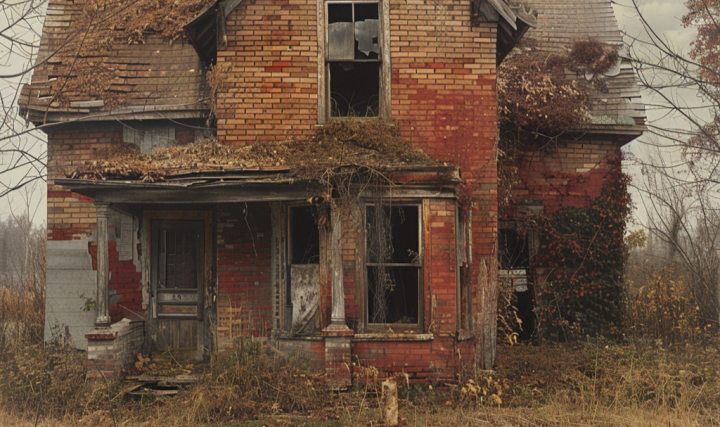Understanding Abandoned Houses
- Definition: Abandoned houses are properties that have been deserted by their owners and are often left in a state of disrepair.
- Common Causes: Economic downturns, natural disasters, legal issues, or personal circumstances such as death or relocation can lead to property abandonment.
- Signs of Abandonment: Overgrown lawns, boarded-up windows, notices from city or county authorities, accumulated mail, and overall neglect are typical indicators.
Benefits of Buying Abandoned Houses
- Lower Purchase Price: Abandoned houses are often sold at significantly lower prices than comparable occupied properties.
- Investment Potential: With proper renovation, abandoned properties can be transformed into valuable assets, providing a good return on investment.
- Customization: Renovating an abandoned house allows you to customize the property to your specific needs and tastes.
- Community Improvement: Revitalizing abandoned properties can improve the neighborhood, increase property values, and reduce crime.
Risks and Challenges
- Hidden Costs: Extensive repairs and renovations are often required, which can lead to unexpected expenses.
- Legal Issues: Complications such as unclear titles, liens, or disputes over ownership can arise.
- Structural Damage: Abandoned houses may have significant structural issues due to neglect, requiring professional inspections and substantial repairs.
- Financing Difficulties: Securing a mortgage or loan for an abandoned property can be challenging due to its condition and perceived risk.
Finding Abandoned Houses
- Local Government and Records: Check city or county records for properties listed as abandoned, vacant, or in foreclosure.
- Real Estate Agents: Work with agents who specialize in distressed properties to find abandoned houses on the market.
- Neighborhood Research: Drive through neighborhoods and look for signs of abandonment. Talking to neighbors can also provide valuable information.
- Online Resources: Websites and databases dedicated to foreclosures, auctions, and distressed properties can be useful in finding abandoned houses.
Steps to Buying an Abandoned House
- Research: Investigate the property’s history, current ownership, and any legal issues. Use local government records and real estate resources.
- Inspection: Hire a professional inspector to assess the condition of the property and identify necessary repairs.
- Title Search: Ensure there are no liens, unclear ownership claims, or legal disputes associated with the property.
- Financing: Secure financing if needed. Consider options like renovation loans specifically designed for properties requiring significant repairs.
- Offer and Purchase: Make a competitive offer based on the property’s condition and market value. Complete the purchase through a formal closing process.
Renovating Abandoned Houses
- Create a Plan: Develop a detailed renovation plan, including a budget and timeline. Prioritize essential repairs and improvements.
- Hire Professionals: Work with licensed contractors, electricians, plumbers, and other professionals to ensure the work is done correctly and up to code.
- Permits and Regulations: Obtain necessary permits and comply with local building codes and regulations.
- Budget Management: Keep track of expenses and adjust the budget as needed to avoid overspending.
- Quality Control: Regularly inspect the progress of renovations to ensure quality and address any issues promptly.
Tips for Success
- Start Small: If you are new to renovating abandoned houses, start with a smaller project to gain experience.
- Network: Connect with other investors, real estate agents, and contractors who specialize in abandoned properties.
- Stay Informed: Keep up with market trends, property values, and new regulations affecting real estate and renovation projects.
- Be Patient: Renovating an abandoned house can be time-consuming and complex. Patience and persistence are key to success.
- Insurance: Ensure the property is adequately insured during and after renovation to protect against potential risks.
Conclusion
Abandoned houses can be a worthwhile investment with the potential for significant financial and personal rewards. By understanding the benefits and risks, conducting thorough research, and carefully planning and executing renovations, you can successfully transform an abandoned property into a valuable asset. Whether you are looking to invest, flip, or create your dream home, the opportunities with abandoned houses are vast and varied.
